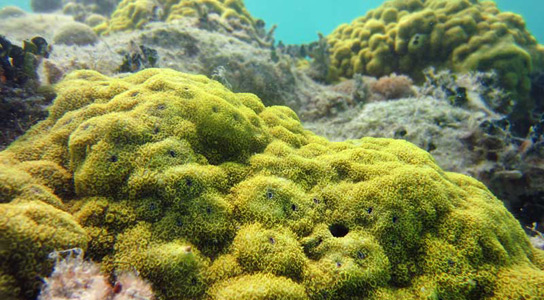
Oceanographers have blamed bleaching of Porites coral from Australia’s Great Barrier Reef on warming water temperatures, ocean acidification, and pollution. Credit: Louis Wray/Creative Commons
If current carbon dioxide emission trends continue, nearly every coral reef would be decimated by 2100, according to a new review of major climate models. The only way to maintain the current chemical environment in which reefs need to live, would be to deeply cut emissions worldwide.
The scientists presented their findings at the American Geophysical Union meeting earlier this fall. The findings indicate that it might even become necessary to actively remove carbon dioxide from the atmosphere, with massive tree-planting efforts or machines of some kind.
The combined stresses of acidification and warming waters, coupled with overfishing and coastal pollution, is taking their toll on coral reefs. Carbon emissions have already lowered the pH of the ocean by 0.1, which has harmed and hindered the bivalves’ ability to grow. The historical record of previous mass extinctions indicates that acidified seas are usually accompanied by widespread die-offs.
Scientists at the Carnegie Institution of Science in Palo Alto, California, analyzed the results of computer simulations performed by 13 teams worldwide. The models included how ocean chemistry would interact with an atmosphere with higher carbon dioxide content. Using the predictions of the models, scientists were able to calculate a key chemical measurement that affects coral. Corals make their shells out of the dissolved carbonate aragonite. As carbon dioxide continues to steadily acidify the ocean, chemical reactions change the extent to which the carbonate is available in the water for coral. Its saturation is generally thought to be between 3 and 3.5.
Paleoclimate data indicates that the saturation level during preindustrial times, before carbon dioxide pollution began to accumulate, was greater than 3.5. The team compared the data with the location of 6,000 reefs for which there is data, two-thirds of the world’s total. This allowed them to do a chemical analysis of the future reef habitats.
The amount of carbon dioxide that will be emitted in the coming decades could have a huge impact on the reefs. In a low-emissions trajectory, in which carbon pollution rates were slashed and carbon was actively removed from the air by trees or machines, between 77% and 87% of the reefs analyzed stayed in the safe zone with the aragonite saturation above 3.
At today’s levels, aragonite saturation would fall below 3, dooming the reefs.









so this is not a significant issue then.